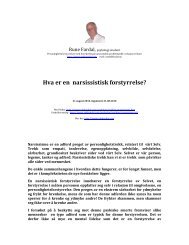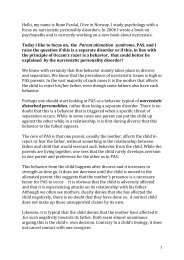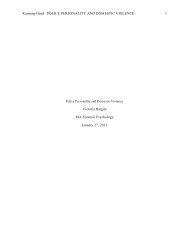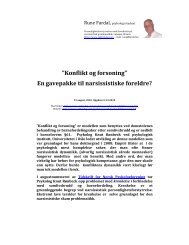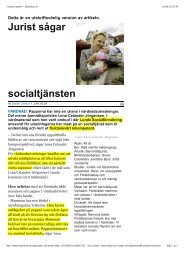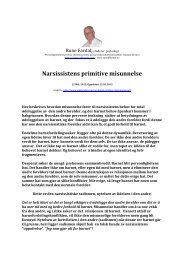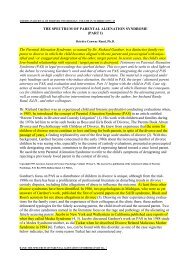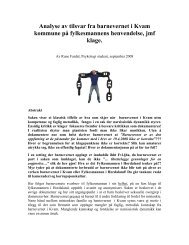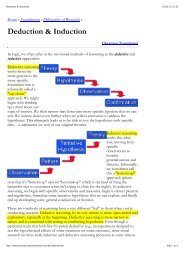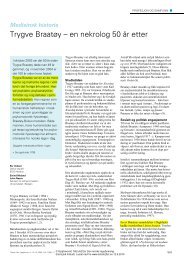The origins of narcissism and narcissistic personality disorder a
The origins of narcissism and narcissistic personality disorder a
The origins of narcissism and narcissistic personality disorder a
Create successful ePaper yourself
Turn your PDF publications into a flip-book with our unique Google optimized e-Paper software.
THE ORIGINS OF NARCISSISM 71<br />
(Lachmann & Beebe, 1989; Stern, 1985). Such preverbal states are<br />
easily explained, without recourse to psychoanalysis, as consequences<br />
<strong>of</strong> mutual caregiver-infant regulation. What requires psychoanalytic<br />
explanation are not babies’ moments <strong>of</strong> affective contentment but instead<br />
adults’ essentially <strong>narcissistic</strong> fantasies about these infantile experiences.<br />
A Reformulation <strong>of</strong> Narcissism <strong>and</strong> Narcissistic<br />
Personality Disorder<br />
By now, it should be clear that the term <strong>narcissism</strong>, at least when used<br />
to characterize normal infant development as objectless, is problematic.<br />
If normal development contains no truly objectless phases, then perhaps,<br />
contrary to Freud’s positing <strong>of</strong> <strong>narcissistic</strong> neuroses, there are no<br />
truly objectless forms <strong>of</strong> psychopathology. In short, if infants, from the<br />
very beginning <strong>of</strong> life, have object relations, then Freud’s (1914/1957)<br />
idea that certain severe forms <strong>of</strong> pathology involve a regression from<br />
object relations to a <strong>narcissistic</strong>, <strong>and</strong> hence objectless, point <strong>of</strong> fixation<br />
becomes untenable. But if <strong>narcissistic</strong> <strong>personality</strong> <strong>disorder</strong> does not<br />
involve a characterologically based absence <strong>of</strong> object ties, the question<br />
arises as to the grounds on which such a <strong>disorder</strong> may legitimately be<br />
called <strong>narcissistic</strong>. <strong>The</strong> following pages contain an admittedly speculative<br />
attempt, on the basis <strong>of</strong> clinical lore <strong>and</strong> empirical research in<br />
social cognition <strong>and</strong> developmental psychology, to answer precisely<br />
this question. Because empirical research indicates that the self-representation<br />
emerges at age 18 months (Amsterdam & Levitt, 1980;<br />
Kagan, 1981; M. Lewis & Brooks-Gunn, 1979), this account will stress<br />
the centrality <strong>of</strong> the second, rather than the first, year <strong>of</strong> life in the<br />
origin <strong>of</strong> <strong>narcissistic</strong> phenomena.<br />
Of course, a simpler argument, given Freud’s (1914/1957) linking<br />
not just objectlessness but gr<strong>and</strong>iosity to the concept <strong>of</strong> <strong>narcissism</strong>, is<br />
that persons with a <strong>narcissistic</strong> <strong>disorder</strong> are especially conceited or<br />
arrogant. This account misses, however, the dialectical character <strong>of</strong><br />
<strong>narcissism</strong> (Andreas-Salome, 1921/1962; Bach, 1985; Grunberger,<br />
1971/1979; Lacan, 1953; Laplanche, 1970/1976)-in this case, the involvement<br />
<strong>of</strong> <strong>narcissism</strong> in some forms <strong>of</strong> low self-esteem. As Grunberger<br />
(1971/1979, p. 3n) wrote, “<strong>The</strong> <strong>narcissistic</strong> person is one who




